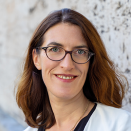When French President Charles de Gaulle and German Chancellor Konrad Adenauer signed the Elysee Treaty on January 22, 1963, reconciliation between the two countries in the aftermath of the Second World War was at the forefront. Since then, Germany and France have developed a unique cooperation mechanism. Although bilateral relations have not been free of conflict, both partners have accomplished a lot over the past five decades.
Normalcy
One can speak of a certain normalcy in Franco-German relations due to common vested rights and routines, said Claire Demesmay. This is true on both the political and societal levels.
Pointing to the survey “Germany, France, and You?” conducted jointly by ARD and Radio France, Sabine von Oppeln explained that mutual perceptions have clearly changed. Interest in Germany—which was previously seen as “ugly”—has grown considerably in France.
Ambassador Maurice Gourdault-Montagne emphasized that reconciliation between the two countries has been achieved. But this normalcy runs the risk of turning into indifference. An active cultural exchange remains the “flame of rapprochement.”
Rolf Mützenich pointed out that normalcy would only be a problem if it leads to boredom. A glance at the everyday agenda shows that this is not the case in Germany and France, as the French operation in Mali makes clear.
Even though the differences between the two countries have often proven to be an important ingredient in their successful cooperation, there is still plenty of room for misunderstanding and irritation, as evidenced by their differing approaches to combating the European debt crisis or in the area of energy policy.
Common Duties in Europe
For civil society, the future of Franco-German cooperation clearly lies in Europe, explained Sabine von Oppeln. Ambassador Gourdault-Montagne emphasized that both countries need to take up their role as the driving force of Europe in a number of areas, especially in combating youth unemployment and in developing a common strategy for migration policy.
Germany and France must also work together closely on European Mediterranean policy, said Andreas Schockenhoff. Rolf Mützenich called for integrating Great Britain at a time when the United Kingdom is increasingly turning its back on Brussels.
The podium discussion was organized jointly by the DGAP, the Free University Berlin, ARTE, ARD, Deutschlandfunk, and Radio France.
Podium
• Maurice Gourdault-Montagne, Ambassador of the French Republic
• Dr. Rolf Mützenich, MdB, Foreign Policy Spokesman for the SPD Paliamentary Group
• Dr. Andreas Schockenhoff, MdB, Deputy Spokesman for Foreign, Security, and Defense Policy for the CDU/CSU Parliamentary Group
• Dr. Sabine von Oppeln, Academic Senior Councilor and Deputy Director of the Center for European Integration at the Free University, Berlin
• Dr. Claire Demesmay, Head of Franco-German Relations Program at the DGAP
• Burkhard Birke, Moderator, Deutschlandradio Berlin
